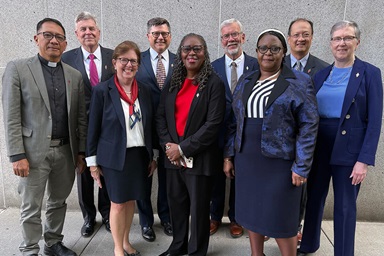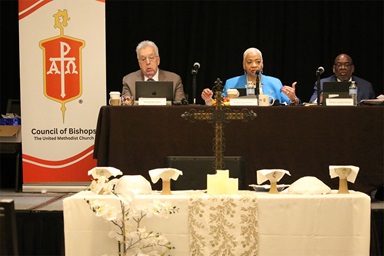A gay pastor and the church counsel for the denomination’s West Ohio Conference are asking the United Methodist Judicial Council to review a March decision by a jurisdictional appeals court.
Those requests are among the 14 items on the top court’s agenda when it meets Oct. 23-26 in Zurich. The Judicial Council also has been asked to rule on proposed legislation for the special General Conference in February 2019.
The Rev. David Meredith, pastor of Clifton United Methodist Church in Cincinnati, Ohio, faced complaints of violating church law after marrying Jim Schlachter, his partner of almost 30 years, in 2016. Three charges were filed against him.
The North Central Jurisdictional Committee on Appeals issued a ruling that the conference’s investigative committee made errors of church law in dismissing some of the charges against Meredith and sent the case back to the conference, asking the committee to re-examine some of its findings.
The appeals committee also asked the West Ohio Conference to hold off on any further judicial proceedings until after the denomination’s special General Conference, which will focus on church policies related to homosexuality.
Both Meredith and West Ohio’s church counsel have appealed the jurisdictional ruling. Meredith argued that he was the rightful respondent before the committee on appeals, not the conference committee on investigation. “His voice was silenced at a critical stage of the judicial process directly applying to his case,” the request to the Judicial Council stated.
In the related appeal, the Rev. Gregory D. Stover and Rodger N. Walk, counsel and co-counsel for the West Ohio Conference, argued that being asked to take a “pause” from the judicial process related to Meredith until the completion of General Conference 2019 was an unfair and “egregious error” of law for all parties concerned.
The Judicial Council also will review a decision of law by the Baltimore-Washington Conference’s Bishop LaTrelle Easterling, who ruled during the 2018 annual conference session that two individuals the Board of Ordained Ministry had approved were not eligible for ordination and commissioning because they are “self-avowed practicing homosexuals.”
The Rev. Mark Gorman asked for the bishop’s ruling because he said the two included in the board’s report did not meet the criteria set by the church’s Judicial Council for “full examination” of a candidate.
Other docket items before the Judicial Council in October include:
- A question from the Council of Bishops about appeals on questions of procedures in an administrative process, particularly related to the involuntary status of a clergyperson.
- A question from the Commission on General Conference over the authority of General Conference “to remove, by vote, a delegate of the body for a violation of the rules of ethics” when a reserve delegate is or is not available to be seated.
- A request by the Standing Committee on Central Conference Matters about mistakes made during General Conference 2016 regarding the retirement of central conference bishops.
- A review of a decision of law by the North Texas Conference’s Bishop Michael McKee that a question on a tabled resolution related to the issue of human sexuality was out of order.
- Reviews of separate decisions of law by Greater New Jersey Bishop John Schol about participation in a lawsuit filed against the New Jersey State Board of Education and Acting Commissioner of the New Jersey Department of Education and about the scheduling of “church superconferences” at locations other than the involved local churches.
Four docket items — from the Upper New York, New England, Pacific Northwest and East Ohio conferences — asked for a declaratory decision about “the constitutionality and legality” of proposed mandatory registration fees for visitors at the 2019 special session of General Conference.
However, the Commission on General Conference on July 12 dropped the $200 registration fees after Moses Kumar, General Conference treasurer, announced the fees were no longer needed as the result of negotiated cost savings and a grant.
Bloom is the assistant news editor for United Methodist News Service and is based in New York.
Follow her at https://twitter.com/umcscribe or contact her at 615-742-5470 or [email protected]. To read more United Methodist news, subscribe to the free Daily or Weekly DigestsLike what you're reading? Support the ministry of UM News! Your support ensures the latest denominational news, dynamic stories and informative articles will continue to connect our global community. Make a tax-deductible donation at ResourceUMC.org/GiveUMCom.




